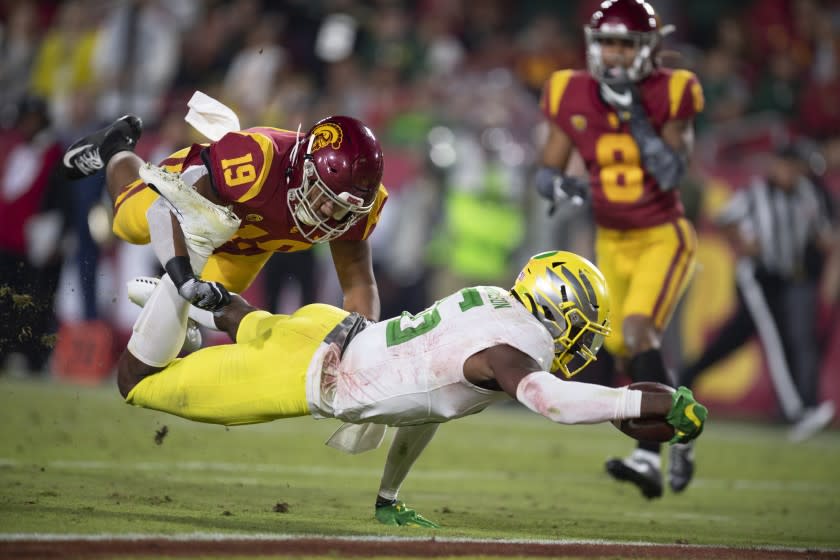Commentary: If goal was to play games that matter, Pac-12 whiffed on revised schedule

Entering this season, there was one Pac-12 football game that I wanted to see — one matchup that would qualify as an obvious national draw.
Of course, this being the Pac-12, that originally scheduled contest was missing from its Saturday morning release of its abridged pandemic plan.
Oregon and USC, the two West Coast programs that have produced sustained stretches of dominance in this millennium, might not play this year after all. The only Pac-12 teams that were ranked in the preseason Associated Press top 25 — the Ducks at No. 9 and the Trojans at No. 17 — were not paired together for the one divisional crossover game in this six-game regular season.
The Pac-12 built some anticipation for its schedule announcement by revealing it on Fox's "Big Noon Kickoff" preview show. It used that stage to hype its first 9 a.m. Pacific game between USC and Arizona State on Nov. 7. Maybe that time slot will prove to work for ratings and become a conference staple, but you know what really puts college football fans in front of their televisions?
Marquee games between familiar powerhouses, of which there are none.
“The schedule announced today is highlighted by exciting and tough matchups that will showcase the depth of our conference and position our teams well for CFP consideration and postseason bowl opportunities,” Pac-12 Commissioner Larry Scott said in a statement.
Saying those words in a news release protected Scott from having to float that notion with a straight face. The truth is that the only real decision to be made by the league in putting this schedule together was each team’s crossover opponent, and, instead of choosing to strengthen the slate for its top teams, it did the opposite.
USC gets Washington State, in its first season under Nick Rolovich. Oregon gets UCLA — no offense, Bruins fans. Utah gets Oregon State. Washington gets Arizona.
“Tried to give our institutions every opportunity to impress not only our peers within the conference, but the CFP and our bowl partners moving forward,” said Merton Hanks, the Pac-12’s new senior associate commissioner for football operations, on the Pac-12 Network.
To be fair, the Pac-12 was not alone in going this route. The Southeastern Conference, in determining its two extra crossover games, gave Alabama, Louisiana State, Florida and Georgia the easiest options possible. The thinking was that it would help its best teams get to the finish line with College Football Playoff résumés intact.
This shouldn’t need to be said, but the Pac-12 is not the SEC. First, the Pac-12, which hasn’t put a team in the four-team playoff since 2016, has basically no capital to carry over from past seasons to buy a little leeway from the CFP committee. Second, while the SEC champion and runner-up will have played 11 games, the Pac-12 champion and runner-up will have played just seven.
The league will need as many of those games to actually count in the eyes of the committee, especially when the SEC is offering unequivocally awesome games all autumn, including Alabama-Georgia, Florida-LSU, Georgia-Florida, LSU-Alabama and the Iron Bowl. That doesn’t even factor in Mike Leach’s upstart Mississippi State team into the intrigue.
The Pac-12 could have matched its perceived top teams and given its programs a chance to make up as much ground as possible in the respect column. Oregon-USC and Utah-Washington would have been meaningful results in either direction.
Say USC beat Oregon in the regular season. Say it handled its five division games, too, taking a 6-0 record into the Pac-12 title game. A second win over Oregon would have provided the Trojans two big wins, and victories over Utah and Arizona State would only add to the sense of accomplishment on the way to 7-0.
That scenario would have held the same promise for Oregon in knocking off USC twice.
But the Pac-12 decided to try to sneak two teams to 6-0 in the hope of billing a huge title fight on Dec. 18. The problem is the conference isn’t set up to have a dominant team this season anyway, much less two.
Oregon is replacing quarterback Justin Herbert, and Outland Trophy winner Penei Sewell opted out to prepare for the NFL draft. USC should have a prolific offense with Kedon Slovis passing in the second year of the “Air Raid,” but the Trojans haven’t shown consistency under Clay Helton.
What the Pac-12 could end up with is a title game with no mojo despite the delicate pruning of this schedule with the playoff in mind.
For this league, at this time, how about just making sure there’s at least one game on your schedule that feels special to a national audience?
This story originally appeared in Los Angeles Times.

